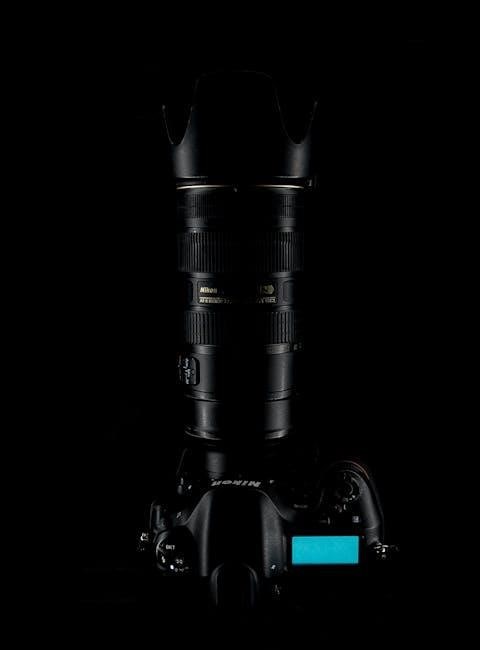iso 14996-12 pdf
Get the ISO 14996-12 standard PDF for your projects. Download the latest version now and enhance your workflow!
ISO 14996-12 is a standardized specification focusing on thermal containers, detailing design, testing, and documentation requirements․ It is part of the broader ISO 14996 series, addressing global transport efficiency and safety․
Overview of the ISO 14996 Series
The ISO 14996 series establishes standards for containers used in international transport, focusing on safety, durability, and efficiency․ It includes multiple parts, with ISO 14996-12 specifically addressing thermal containers․ The series provides comprehensive guidelines for design, materials, and testing, ensuring compliance with global transport requirements․ These standards are developed by international experts to harmonize practices across industries, fostering consistency and reliability in container manufacturing and use worldwide․

Focus on Thermal Containers in ISO 14996-12
ISO 14996-12 specifically addresses requirements for thermal containers, ensuring their design, materials, and performance meet rigorous standards․ It focuses on maintaining temperature control, durability, and safety during transport․ The standard provides detailed guidelines for testing and certification, ensuring thermal containers are fit for global logistics․ This part of the series is crucial for industries relying on temperature-sensitive cargo, offering a framework to enhance efficiency and compliance in international transport operations․

Key Features and Requirements
ISO 14996-12 outlines essential requirements for thermal containers, including materials, durability, and safety standards․ It ensures compliance with global transport efficiency and operational demands․
Materials and Durability Standards
ISO 14996-12 specifies strict criteria for materials used in thermal containers, ensuring robustness and resistance to environmental factors․ Durability tests verify longevity under operational stress, guaranteeing safety and efficiency in transport․
Performance and Safety Criteria
ISO 14996-12 outlines rigorous performance standards, ensuring thermal containers maintain consistent temperatures and withstand external conditions․ Safety criteria include fail-safe mechanisms and hazard prevention, prioritizing user protection and operational reliability in global logistics․

Design and Testing Guidelines
ISO 14996-12 provides detailed guidelines for designing thermal containers, emphasizing structural integrity and performance testing to ensure compliance with international standards and operational reliability․
Structural Design Specifications
ISO 14996-12 outlines precise structural requirements for thermal containers, ensuring load-bearing capacity, thermal insulation, and durability․ It specifies material strength, dimensional tolerances, and manufacturing processes to guarantee reliability during transport․ The standard emphasizes adherence to international safety and transport regulations, ensuring containers withstand environmental stresses and maintain integrity under varying conditions․ These specifications are critical for manufacturers to meet performance benchmarks and comply with global logistics standards effectively․
Testing Protocols for Compliance
ISO 14996-12 establishes rigorous testing protocols to ensure thermal containers meet specified standards․ These include thermal performance tests, durability assessments, and safety evaluations under simulated transport conditions․ Environmental stress tests, such as temperature variations and vibration, are conducted to verify container integrity․ Leakage tests and structural load evaluations are also mandated to confirm reliability․ Compliance verification involves detailed documentation of test results, ensuring adherence to international transport regulations and maintaining product quality and safety standards throughout the supply chain․
Documentation and Compliance
ISO 14996-12 emphasizes strict documentation practices to ensure compliance with international standards․ Detailed records of testing, materials, and design must be maintained for verification and traceability purposes․
Documentation Requirements
ISO 14996-12 mandates comprehensive documentation for thermal containers, including design specifications, test results, and material certifications․ Detailed records must be maintained to ensure compliance with international transport standards․ These documents serve as proof of adherence to safety and performance criteria, facilitating audits and traceability․ Proper documentation is essential for certification and acceptance in global markets, ensuring transparency and accountability throughout the supply chain․ The standard emphasizes accuracy and completeness in all submitted records․
Compliance with International Transport Standards
ISO 14996-12 ensures thermal containers meet international transport standards, focusing on safety, durability, and performance․ It aligns with global regulations, facilitating seamless integration into international logistics․ Compliance verification involves rigorous testing and inspection of materials and design․ The standard promotes harmonized practices across borders, reducing risks and enhancing operational efficiency․ Adherence to these standards is critical for ensuring safe and reliable transport of goods worldwide, while also supporting environmental and safety objectives․ This compliance streamlines global logistics and trade activities effectively․

Revisions and Updates
ISO 14996-12 undergoes periodic technical revisions to enhance clarity and effectiveness․ Updates are made by a dedicated committee, ensuring the standard remains relevant and aligned with industry needs․

Technical Revisions in Recent Versions
Recent updates to ISO 14996-12 have focused on improving the standard’s clarity and technical accuracy․ These revisions include updates to material specifications, testing protocols, and documentation requirements․ The changes aim to reflect advancements in technology and address emerging industry needs․ A dedicated technical committee reviews and refines the standard to ensure it remains effective and applicable across various global markets․ These updates are crucial for maintaining compliance and ensuring the standard continues to support safe and efficient container usage․
Committee Review Process
The ISO 14996-12 standard undergoes a rigorous review process led by a technical committee comprised of global experts․ These experts collaborate to assess and refine the document, ensuring it aligns with industry advancements and user needs․ The committee follows a structured framework, incorporating feedback from stakeholders and conducting thorough analyses․ This collaborative approach guarantees that the standard remains relevant, effective, and adaptable to evolving market demands, while maintaining its credibility and acceptance worldwide․
Availability and Access
The ISO 14996-12 PDF is accessible online, enabling easy downloading from official repositories․ Its availability ensures users can obtain the document conveniently and efficiently․
Online Availability of ISO 14996-12 PDF
The ISO 14996-12 PDF is readily accessible online, offering users the convenience of easy downloading from various repositories and official sources․ This availability ensures that manufacturers, logistics professionals, and other stakeholders can quickly obtain the document to review its detailed requirements and guidelines․ The online accessibility of the standard supports global compliance and efficient implementation, making it a vital resource for industries relying on thermal containers for international transport․
Repositories and Official Sources
The ISO 14996-12 PDF is available through official ISO repositories and trusted online platforms․ These sources ensure the document’s authenticity and compliance with the latest standards․ Users can access the PDF from the ISO website or authorized distributors, guaranteeing accurate and up-to-date information․ Additionally, national standardization bodies and specialized archives provide access, making the document widely accessible to professionals worldwide․ These repositories are reliable and secure, ensuring the integrity of the standard for global users․
Applications and Industry Impact
ISO 14996-12 plays a crucial role in global logistics, ensuring thermal containers meet safety and efficiency standards․ Its adoption enhances manufacturers’ compliance and user confidence worldwide․
Role in Global Transport and Logistics
ISO 14996-12 plays a pivotal role in global transport by standardizing thermal containers, ensuring their design, testing, and documentation meet international safety and efficiency requirements․ Its guidelines facilitate seamless integration across various transport modes, enabling consistent performance and reliability․ Compliance with this standard helps manufacturers and users align with global logistics demands, reducing operational challenges and enhancing the overall efficiency of international transport systems․
Benefits for Manufacturers and Users
ISO 14996-12 provides clear guidelines, enabling manufacturers to produce compliant thermal containers efficiently while minimizing costs․ Users benefit from enhanced safety, durability, and reliability, ensuring consistent performance in various transport conditions․ Compliance with this standard also offers manufacturers a competitive edge, as it aligns with global market demands and facilitates access to international trade․ This mutual benefit drives innovation and satisfaction across the supply chain․
International Collaboration
ISO 14996-12 exemplifies international collaboration, uniting global experts to develop standardized solutions․ This fosters innovation, consistency, and trust, enabling efficient and safe practices across industries worldwide․
ISO’s Role in Global Standardization
ISO plays a pivotal role in global standardization by uniting international experts to create universal standards․ Through ISO 14996-12, it ensures thermal containers meet rigorous specifications, fostering consistency and safety․ This collaboration drives innovation, enabling industries to operate efficiently across borders․ By setting clear guidelines, ISO helps manufacturers and users align with global practices, promoting trust and reliability in international markets․ Its standards are cornerstone for modern trade, ensuring quality and interoperability worldwide․
Collaboration Between Experts and Organizations
ISO 14996-12 is developed through collaboration between global experts and organizations, ensuring diverse perspectives are integrated․ This collective effort refines standards for thermal containers, aligning with international transport needs․ Technical committees, comprising industry specialists, work together to define specifications, fostering innovation and efficiency․ Such collaboration ensures the standard is comprehensive, addressing materials, durability, and safety․ This inclusive process strengthens global trade by providing a unified framework for manufacturers and users to adhere to, promoting consistency and reliability worldwide․

ISO 14996-12 plays a vital role in standardizing thermal containers for global transport, ensuring safety and efficiency․ Its future updates will continue to refine and enhance its relevance․
ISO 14996-12 is crucial for standardizing thermal containers, ensuring safety and efficiency in global logistics․ It provides clear guidelines for materials, design, and testing, enabling compliance with international transport standards․ By harmonizing requirements, it facilitates seamless operations across borders, benefiting manufacturers and users alike․ Its emphasis on durability and performance makes it indispensable for modern transport systems, ensuring reliability and consistency in diverse environments․
Future Prospects for the Standard
ISO 14996-12 is expected to evolve with advancing technologies and industry needs․ Future revisions may incorporate sustainability practices and digital integration, ensuring the standard remains relevant․ As global logistics grow, its role in harmonizing international transport standards will expand, fostering collaboration among experts․ The standard will likely address emerging challenges, such as environmental impact and smart container systems, solidifying its importance in the global supply chain․ Continuous updates by the technical committee will ensure its adaptability and effectiveness in meeting future demands․

